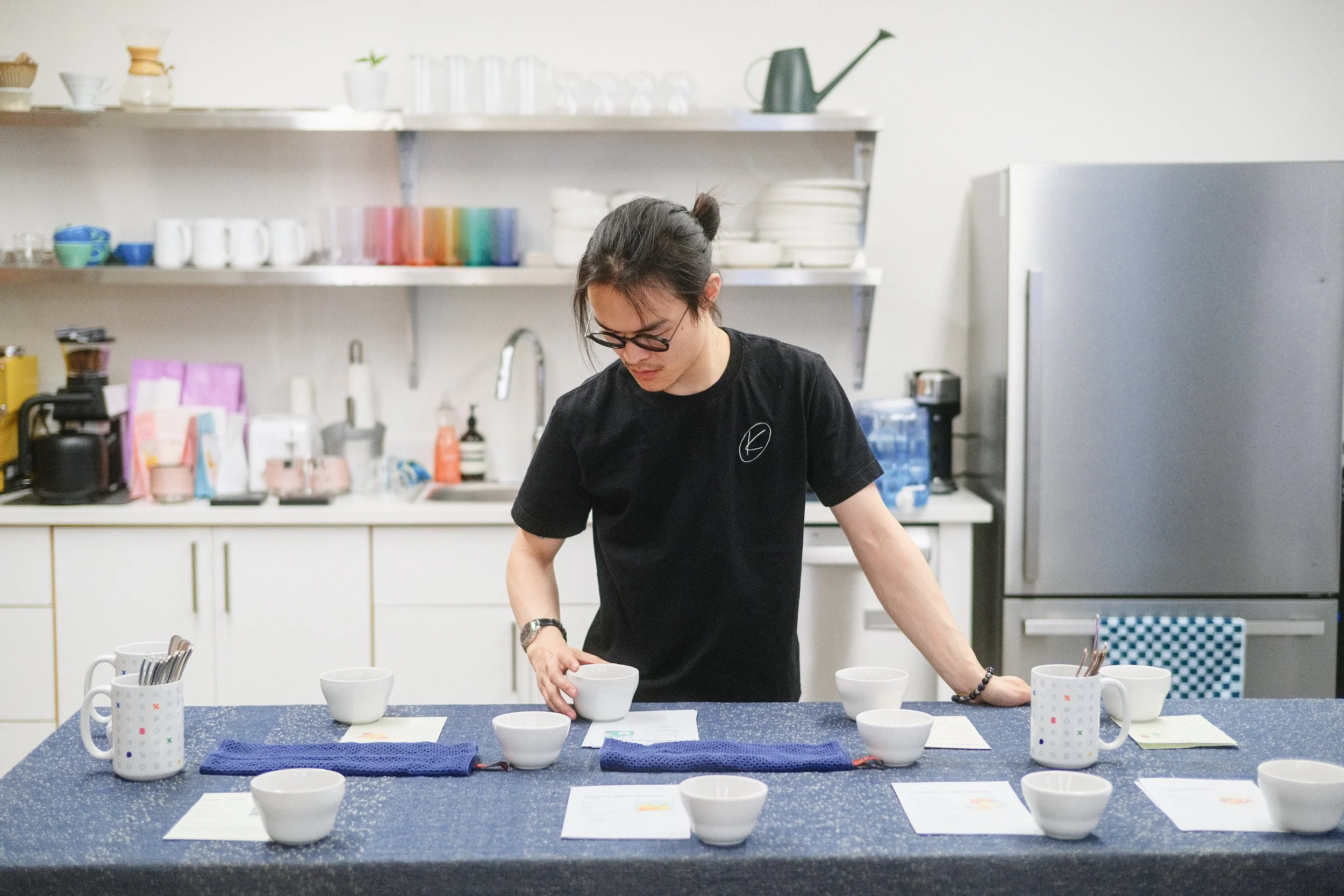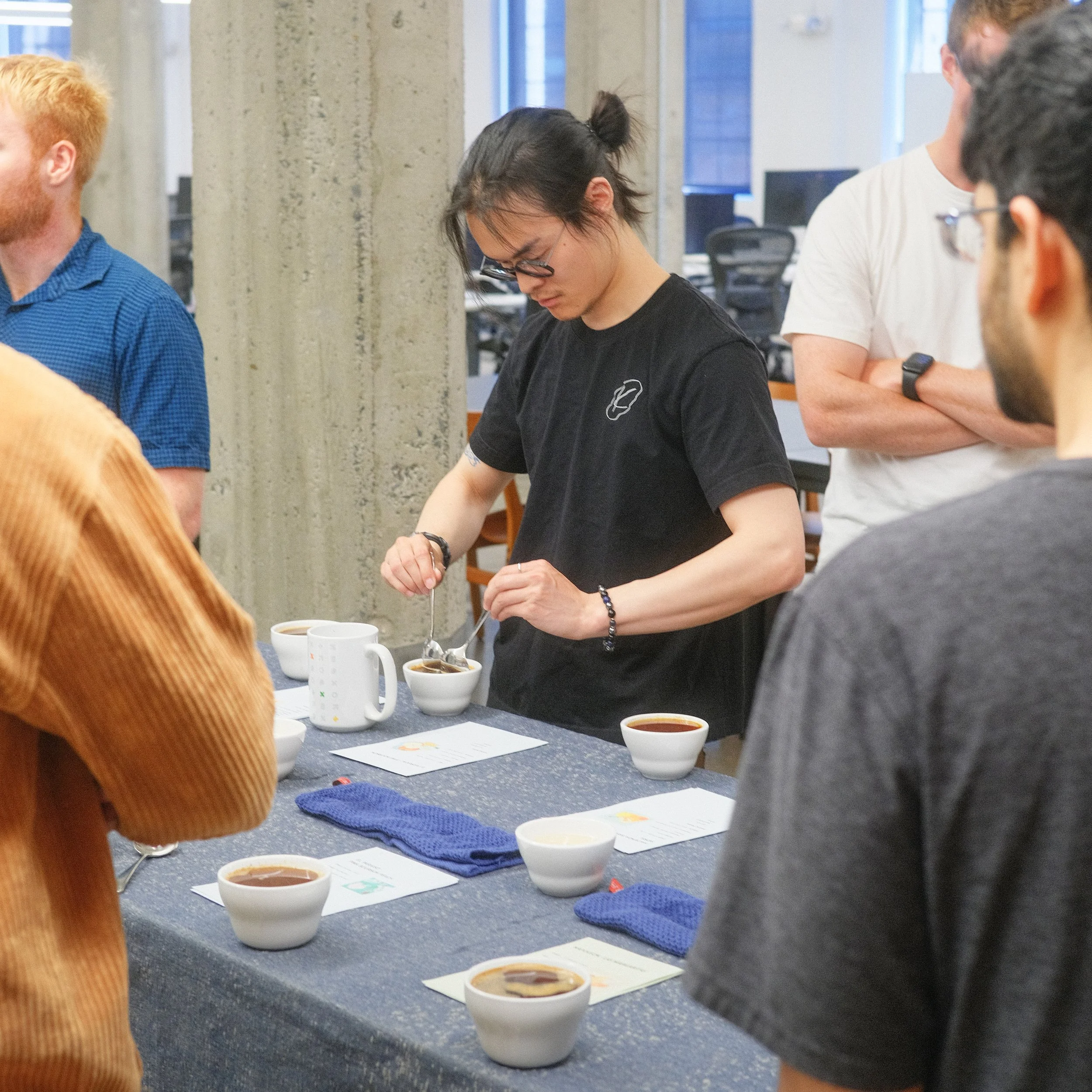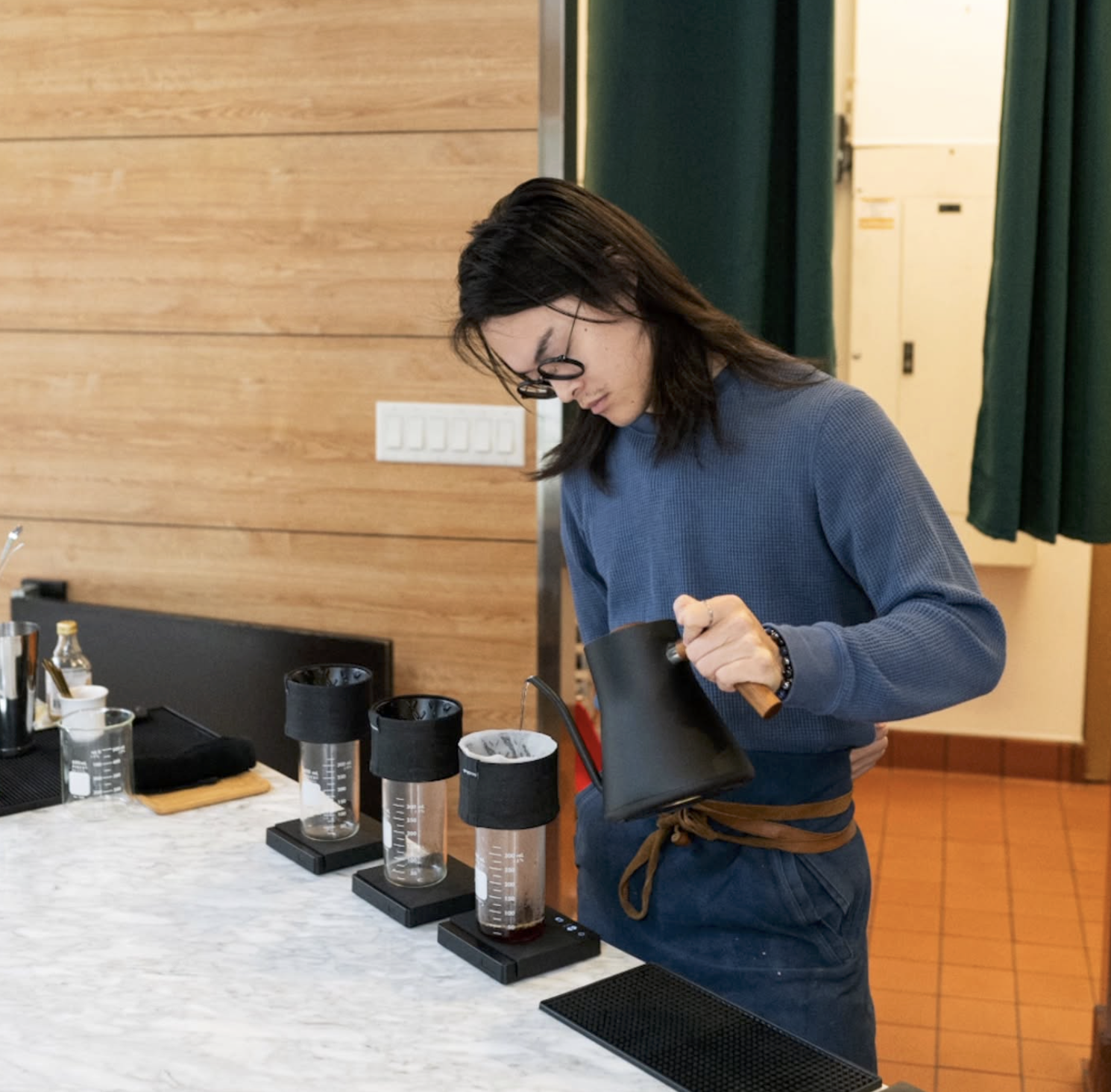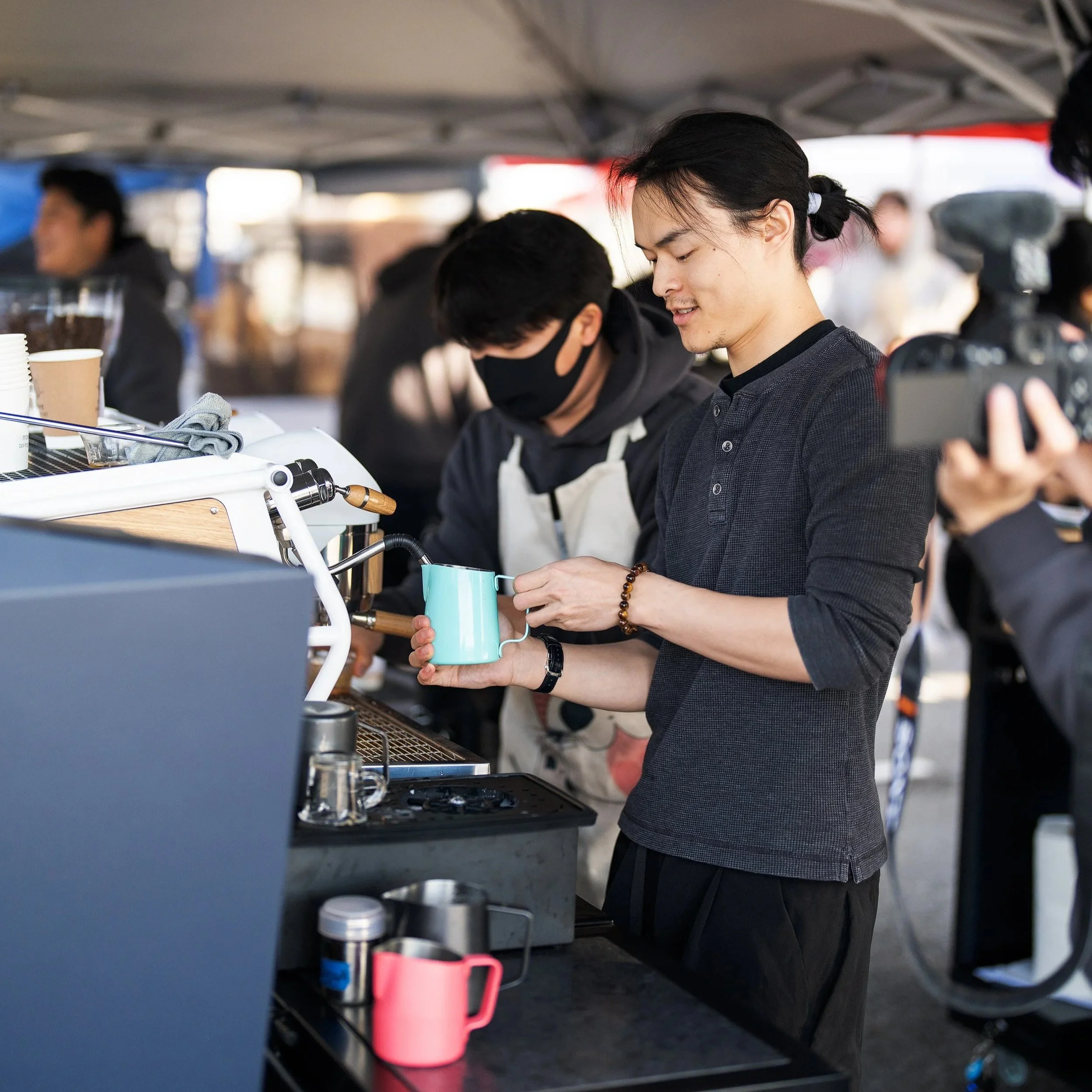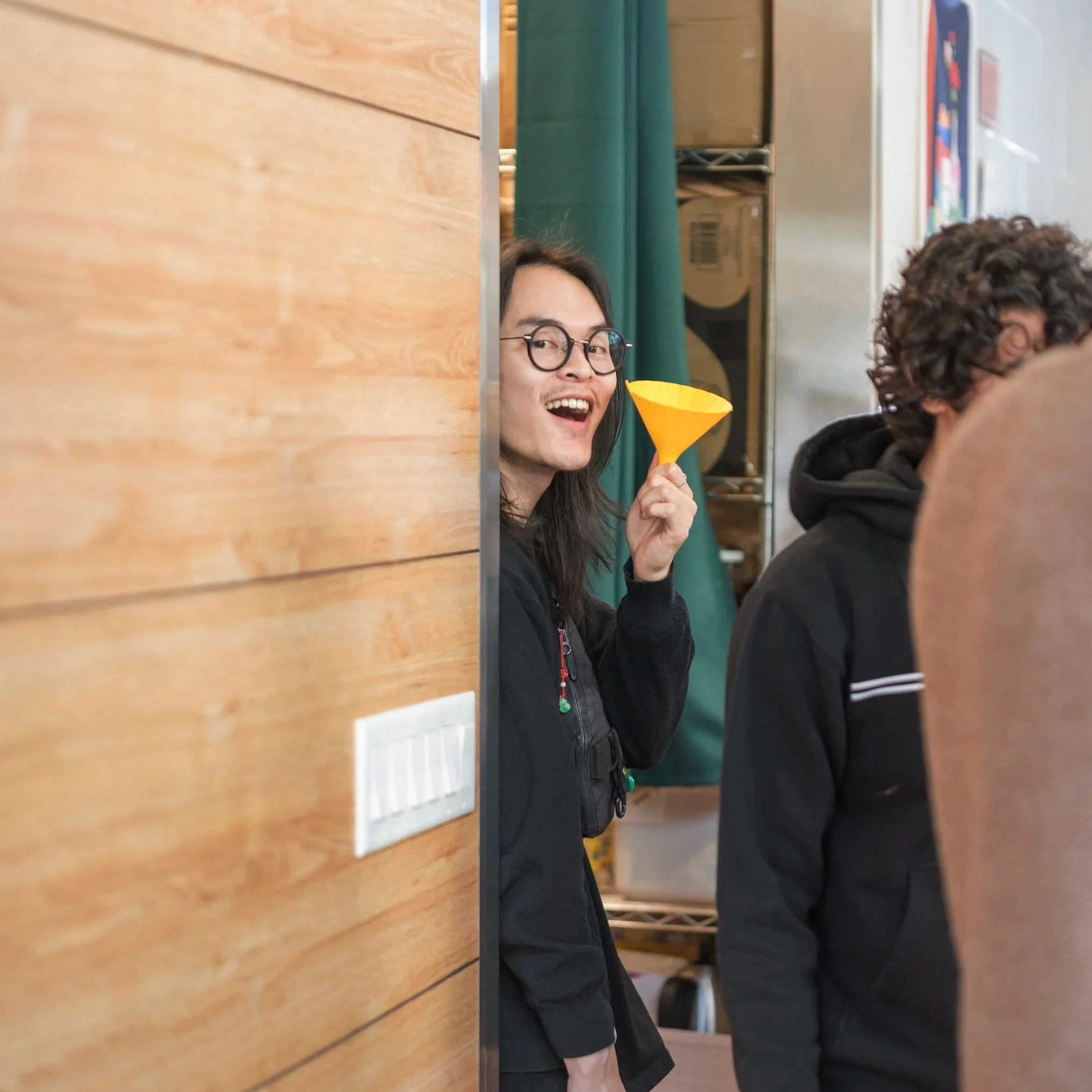Guest Post - Kieran with a Q
The first guest post comes from Kieran Eng, a coffee professional with around a decade of experience in industry. He currently co-owns and runs the Komakase coffee omakase popup among other roles throughout the SF Bay Area coffee scene.
I met Kieran as mutual community representatives in the Bae Area Coffee community. As Kieran pursued and earned his Q-grader certification, he offered to write down his thoughts to help other coffee enthusiasts determine whether the investment is suitable for their goals.
Note - Over the time this post was written, drastic changes were made to the identity of the Q-grader program. In short, program ownership shifted to the Specialty Coffee Association (SCA) and his new certification was immediately rendered lapsed, mandating more coursework to be paid for and completed. A preface has been added ahead of the rest of the material.
Everything from here on out comes from Kieran.
Preface-
This was written in the wake of a significant shift within the specialty coffee community. My name is Kieran Eng. I am a freshly certified Q grader as of March of this year (2025). Like many of my peers I am frustrated with the joint announcement from the SCA and CQI regarding the hand off of the Q Certification Program from the CQI to the SCA and the requirement of all existing and lapsed Q graders to complete further education and training towards the use of the CVA form. I have had some time to digest and understand the full scope of the sudden adjustment and am still finding it difficult to fully articulate how I feel about the changes we are faced with.
As things stand in the current situation, a lot of uncertainty surrounding the dynamic of specialty coffee has created a divide between the dedicated professionals working to build stronger relationships between consuming and producing countries and the non-profit organizations whose stated mission is to be ‘dedicated to making coffee better by fostering a global coffee community and supporting activities to make specialty coffee a thriving, equitable, and sustainable endeavor for the entire value chain.’ The transition to the CVA is a mixed bag of good intentions and corporate greed. To the credit of the SCA, partnering with producing regions for endorsements of the new alignment system is a good way to entice many professionals in the space to acquire their ‘evolved Q’ certification through CVA form calibration classes.
I crafted this reflection of my year and a half long period between my initial Q course combo and the completion of said certification In March of 2025 as a way to make sense of the transition into a new specialty coffee space. I feel these thoughts speak to a greater issue within the core infrastructure of the specialty coffee industry; an issue that persists both economically and systemically. I am in some ways complicit and benefiting from a system that disproportionately seeks to absorb value from producing regions.
This response to a few prompts from my friend Robert Asami, a deeply passionate enthusiast and home roaster. As such, the following article is a sort of Q&A between him and I where we aim to potentially help others bridge a gap in understanding between enthusiasts and professionals.
What is the Q?
I want to preface this by saying nobody needs to have a Q certificate to critically taste coffee. The two things that will matter most is how you taste and how often. The Q is not a fast track to getting good at tasting, it just becomes a part of your experience. For many, the program can buy some level of instant credibility, it being an intensive week-long endeavor that really does put you through the wringer of tasting a wide (but not full) range of what specialty coffee has to offer. By and large it is a path to learning how to score and price discover specific coffees. The program is meant to ensure that folks who are looking to get into buying green coffee are able to consistently taste, score and articulate their experience of roasted samples of coffee. Many coffee companies will have a Q grader as their decision maker for green coffees their company may want to purchase. That is not to say that a green buyer must have a Q certificate in order to fulfill the role, rather Q graders are more likely to understand the proper protocol to follow in fully understanding the potential value a coffee holds and what role that coffee could potentially play on their menu.
During my initial instruction, our instructor Sandra Loufburrow prefaced the course by asking us to keep one thing in mind, “Remember that every coffee has a home. Regardless of how you feel about it, each coffee on the table deserves to go to a good home.” Even if the coffee is sub-specialty. Even if it scores over 90 on your sheet. That coffee is the fruit of a laborious process that took many hands to get to the table. This was the biggest takeaway of the course for me. Every time I step up to the cupping table I remind myself to be as nice to the coffee as I possibly can.
Overall the Q is fairly straightforward. You spend a week understanding the many facets of what coffee can express. The first three days are lectures and practice tests for the last three days which are all set aside for exams. I’ll link Feran’s blog post on his recommended strategy on taking the Q to save myself from going too in depth in describing the ins and outs of the course. However, I will give a brief overview of my thoughts for each module and how it pertains to tasting coffee as a whole.
A major part of the Q that many people do not realize before taking the course is the emphasis on olfactory calibration and skills. Roughly speaking, about 60-70% of what we’re experiencing in taste can be attributed to what we’re smelling. The Q program has many modules focused around smell, targeting specific groups of scents that are recommended to be memorized. The scents are grouped into 4 categories based on the Le Nes du Cafe scent set. This set is a box of small vials labeled to their corresponding scents for students to blindly match during the exam. The 4 groupings include enzymatic aromas, sugar browning aromas, dry distillation and aromatic taints. Each of these groups focuses on specific aspects of coffee that help us more accurately describe the experience of smelling and tasting.
Who is the Q for?
I wholly believe that the Q can be for anyone with the desire to develop their skills in tasting coffee. The experience you gain from understanding how you experience tasting coffee in direct comparison to a cohort of fellow tasters breeds a calibrated understanding of alignment. In that vein the Q is for those who find value in being a part of an international community of calibrated individuals who are able to taste beyond their own personal preferences and judge a coffee as objectively as possible.
Professional use cases for the Q can vary widely depending on the opportunities already available for individuals. In most cases any person who is already conducting a green buying operation or people within the training/QC department of a coffee company would benefit greatly from at least going through the Q process. Even if you don’t pass, the Q provides you with many tools to help understand and articulate what you are experiencing while tasting specific coffees. Having a Q grader within your company in some capacity will hopefully help center your coffee program and retain a baseline of coffee quality.
Many Q students travel from around the world to take these exams with specific instructors. I’ve cupped with people from all over the US and all over the world. So suffice it to say that this course is not for the faint of heart and those who just want to have a certificate in tasting coffee.
If you are solely interested in learning how to taste coffee the Q may not be for you. The steep price of around 2 thousand dollars as well as the time commitment of a whole week can be a lot of overhead investment for an individual to incur for the singular purpose of learning how to align taste to a cohort of calibrated individuals. If you have no interest in aligning yourself with that standard of tasting you may be better off finding a local community of coffee enthusiasts to share your tasting experience with. This way you can still share coffee with others but in a lower pressure and less formal setting.
Many Q venues also hold smaller workshops for those interested in learning more about how to analytically taste coffee. These workshops are often free or very affordable compared to the Q and will help you decide whether or not becoming certified is the right choice personally or professionally.
I believe that any QC professional, green buyer and roaster would benefit immensely from becoming certified. Enthusiasts and even baristas can certainly benefit from going through the program but I would recommend investigating more affordable options to gain that tasting experience. That might include introductory sensory analysis courses at various coffee labs around the country or the world. I can find resources for venues that can provide that level of experience but the go to for those of us in the Bay Area would be The Crown which is Royal Coffee Importers tasting lab.
In my opinion, the single greatest challenge of the Q is developing confidence in yourself and trusting your initial gut reaction to the cups that are placed in front of you. Tasting is just interfacing with your own memory and the more standout experiences you have in your sensory memory bank, the easier it will be for you to accurately articulate what you find within individual coffees. It was only after developing that level of confidence, I was able to help others around me understand coffee on a deeper level, both in analyzing the quality of the green and quality of the roast. And while the Q is no substitute for learning how to roast, the amount of coffees you get to interact with helps provide a larger foundation of reference for when a roaster steps back into production or sample roasting.
Thoughts on the Q Process
Why does the Q program exist? What does having alignment/calibration mean?
Please forgive my long winded answer to this question. Many things have changed since the initial draft of this article and I needed to include an addendum to my original thoughts on the Q program as a whole.
For better or worse my life has revolved around coffee and in part this certification for the better part of the last year and a half. I have been privileged enough to share cupping tables with esteemed professionals with a ton of expertise, many of whom have completely abandoned their pursuit of getting Q certified. In light of the recent adjustments and the transition away from a CQI controlled Q program to one run by the SCA, I understand the choice that those individual professionals have made. We’re in a space where we vote with our dollars; however, integrity and honesty are the currency that we should ideally place our faith into. From crop to cup, calibrated professionals have and hold a responsibility to accurately assess and communicate the value of coffees produced around the world. In my initial Q course, my instructor Sandra Loufborrow stated that ‘every coffee has a home, and we should strive to be nice to each coffee that lands on our cupping table,’ an ideal that has become instilled within me through my tasting experiences.
With the Q transitioning into the hands of the SCA, I can’t help but feel taken advantage of. I am being told that the hard work, time and monetary investment I initially put into earning the Q certification was not enough, and that to retain my status I would need to complete additional training for an added expense. While at its core I expect the Q to operate and stand for the same values and ideals our instructors had instilled in us, the need to justify how much I deserve to retain the certification feels arbitrary and like a cash grab. And even writing that out makes me feel like I’m knee jerking quite a bit.
However, this change goes beyond my own personal plight. In a move that essentially upends the standard of quality control within the specialty coffee industry, the SCA has undone a system that while imperfect, was a solid and respected platform for coffee professionals to align their palates to other like minded and certified individuals around the world. That leads me to feel all the more eager to add my voice to the discourse concerning the definition of coffee quality and bring questions to my peers that could provoke a fresh wave of other young professionals within the space to create a better way to express their thoughts.
What does alignment mean to you?
In my mind alignment and calibration within the specialty coffee community has everything to do with realizing our own biases but being able to set those things aside and attempt to objectively score a coffee in a way that can be understood by another calibrated individual on the other side of the globe. Having the certification doesn’t mean you are necessarily any better than other experienced tasters, rather it specifically shows that you understand how other individuals within the Q system should ‘theoretically’ judge coffee. Being aligned with other Q graders does not mean that I am no longer able to calibrate to other tasting individuals. As long as I am able to separate individual biases and adjust to the tastes of the other folks on the cupping table we can come to some sort of alignment based on our collective experience on the table. That separation is key to maintaining some level of objectivity while acknowledging everyone’s equipment (palate) is a bit different.
What value have you found the program to have provided to your professional career?
Having gone through the Q program I have been exposed to an innumerable amount of coffee that I otherwise would have had to search for on my own, all processed and roasted in a way that illustrated the depth and range of flavor that coffee can express. I have also had the opportunity to meet many individuals who are like minded within the coffee industry and share my level of passion. Many of my peers have deeply influenced my own perspective on how to approach tasting critically as a skill and has helped me internalize the notion that everyone has a valid perspective based on their current level of knowledge and experience.
What takeaways do you have from going through the course?
Tasting can be a communal experience rooted in shared memory. By tasting together with your peers you get a deeper understanding of how to articulate your flavor calls to others. Awareness of everyone’s differing cultural backgrounds is paramount to understanding why fellow tasters may have biases or preferences towards a specific coffee. The nuance of flavor memory and flavor recall is all within how you are able to articulate a specific feeling of when you consume something. We are the sum of all of our experiences and that is what creates a dynamic tasting experience for participants within Q. I would argue that Q raises the floor and ceiling for tasters in that the overall experience you can immediately share with the folks you're tasting with. It’s also possible to raise the potential to share even more with others that aren’t within your immediate vicinity by extension of folks that you’ve tasted with using your descriptive language further on in their own coffee journeys.
What was the most difficult part of the week-long exam?
For me the most difficult aspect of Q is palate fatigue. In my experience and opinion, no amount of practice can prepare you for this specifically. Unless students are constantly tasting coffees all day every day for your job already, they will have a hard time adjusting to the sheer amount of coffee you have to taste. There are strategies and techniques to help mitigate this. For example, my second round instructor Evan Gilman recommended that we don’t over taste the coffees on each table and instead make a few intentional passes with the intention of identifying key aspects of each coffee with each slurp. This helped me immensely by forcing me to go with my gut feeling on each coffee which ended up being correct in the end. If I hadn’t second guessed myself the first time around I very likely would have passed on my first attempt.
What was the most challenging module of the test and what do you recommend to other folks taking their Q exams in the future?
The most challenging module for me was roast ID for sure. I hadn’t practiced tasting defective roasts intentionally before and having to ID them in triangulations after blowing out my palate tasting everything else from exam week was difficult. Utilize any defect kits you can find. I also would recommend two things; trusting your gut reaction and letting the coffees cool in triangulations. Your first instinct will very likely be your best and letting the coffees settle and cool will help you identify different characteristics of the coffees on the table, whether that be acid perception or some level of sweetness etc.
What do you think about the comparison of Q graders to sommeliers and how some Q graders see themselves as such?
I feel the comparison is a bit unfounded. People are grasping for a way to compare Q graders to other professional titles within adjacent industries. To a degree, a Q grader is similar in function to any QC position within adjacent beverage industries, whether that be wine, whiskey, tea etc. While Q graders can provide education, similar to a somme, their main responsibility is to QC. So while similar, the positions aren’t exactly one to one. Any Q grader who compares themselves to sommeliers may have ulterior motives for such a comparison.
A sommelier’s primary job is to help guests make an informed decision about what wine they would most enjoy. As a people facing position a somme does need to be aware about the qualities of the wines they serve but is also people facing. Most Q graders are not directly interacting with the end customers they serve. The closest analog to a sommelier would be a knowledgeable barista but that seems to also be a crude mismatch in professionalism.
Compared to what you knew prior to the course, what does Q not cover/clarify? e.g. Processes, varietals, brew methods, roasting, brewing.
This is definitely a big misconception that folks have that I can and will address. My overall take is that a Q grader is not the equivalent of what a Sommelier is to wine. The Q only covers tasting skills and does not teach one how to brew, roast or educate others about coffee. Q is primarily about how to assess coffees and communicate what you are experiencing to other ‘calibrated’ individuals. All of the other disciplines within coffee are peripheral and thought to be understood within Q that they have their own interpretations for brewing, roasting and education. There is however a general knowledge module where questions about process, varietal and roast do come up. It is assumed that coffee professionals pursuing a Q certification have some level of knowledge and background within coffee. Q does not teach you everything. It only teaches you palate assessment skills as it pertains to grading the potential a particular coffee has. However those skills can be transferable to other aspects of the industry and to other taste related industries as well.
Since obtaining the Q-grader license, how has it affected your view coffee as an enthusiast?
I feel like I look at coffees more holistically now than I did before, however I am much more confident in what I know I like and that gives me extended confidence within service, illustrating to others why I may enjoy a specific coffee. When looking at tasting notes on a website/identifying specific flavors I can confidently fill a menu slot with a coffee I know we can work with and help it express in the way the producer and roaster expected it to. Their notes help me make an informed decision on what to buy and I can buy with more confidence.
Closing remarks
My own journey through the Q was stretched out and really made me reconsider my path in specialty coffee. I feel that I wouldn’t understand coffee the way I do now without having gone through the experience of calibration and understanding my own physiology in how it relates to the way I experience flavor, not only in coffee but in all other aspects of what I consume. Q has helped me build a mental framework that recontextualizes tasting as a multifaceted experience. I wouldn’t necessarily recommend anyone take the Q as its transitioning into its new current state, but I would encourage folks to participate in workshops geared towards understanding coffee quality and why professionals make specific judgements.
Have questions or just wanna chat? Hit me up on Instagram.
Happy brewing!
Thanks for the detailed thoughts Kieran. You can see what he’s up to in coffee here:

